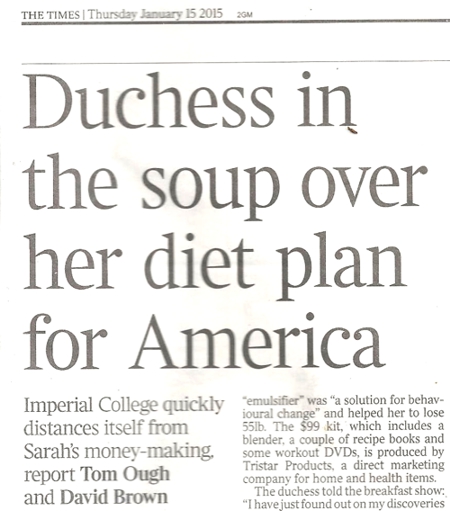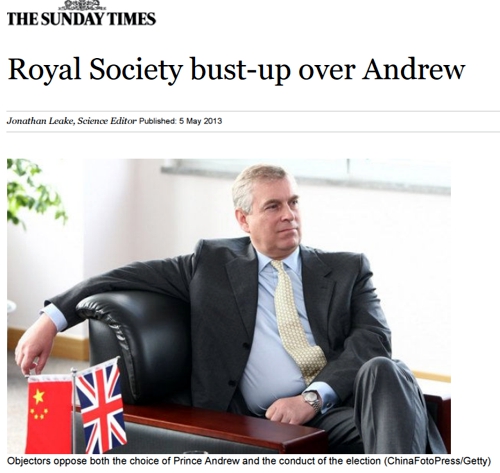Prince Andrew
Sarah Ferguson, ex-wife of Prince Andrew, Duke of York, seems to need a lot of money. Some of her wheezes are listed in today’s Times. That’s behind a paywall, as is the version reproduced in The Australian (Murdoch connection presumably). You can read it (free) here, with more details below the article.
|
Thomas Ough and David Brown Published at 12:01AM, January 15 2015 In her seemingly endless quest to make money, Sarah, Duchess of York, has had little hesitation using her title to generate sales. This week, though, she landed herself in trouble after appearing to use the name of Britain’s foremost scientific university to lend credibility to a promotion for her new diet system. The duchess told NBC’s Today show during an interview to promote her “emulsifier” programme that she was aware of the dangers of obesity through her work as an ambassador for the Institute of Global Health Improvement at Imperial College London. Last night she apologised for “any misunderstanding” after Imperial College, ranked the joint second-best university in the world, sought to distance itself from the duchess’s promotion. A spokesman said: “The commercial activities promoted by Sarah Ferguson in the interview with Today are not connected in any way to Imperial’s staff or research activities, and the college does not endorse the suggestion of any possible link.” The institute, which has more than 160 specialists, including clinicians, engineers, scientists and psychologists, is headed by Lord Darzi of Denham, a former Labour health minister. The duchess told the Today presenter Matt Lauer that she had been a comfort eater since the age of 12 but the “turning point” was when she realised that she was the same weight as when pregnant with Princess Beatrice, now 25. “I couldn’t bear looking at myself any minute longer,” she confided. “In fact, the size of my ass probably saved my life.” She said she discovered that the “emulsifier” was “a solution for behavioural change” and helped her to lose 55lbs. The $99 kit, which includes a blender, a couple of recipe books and some workout DVDs, is produced by Tristar Products, a direct marketing company for home and health items. The duchess told the breakfast show: “I have just found out on my discoveries with Imperial College London . . . I’m an ambassador for the Institute for Global Health Innovation, and I found out that children, little children, are going to die before their parents because of obesity.” The benefits of the kit were questioned yesterday by Ayela Spiro, a senior scientist at the British Nutrition Foundation. She said: “In terms of the particular product, no juicer or blender on their own can enhance how much nutrition your body will absorb. Any claims made about such products such that it accelerates weight loss, boosts energy and strengthens the immune system need to be treated with caution.” Professor David Colquhoun of University College London, said: “I find it pretty amazing that Imperial chose someone like her to be an ‘ambassador’. Imperial does have an interest in appetite suppression but hasn’t come up with any usable product yet and this research has nothing to do with blenders. “[Her television appearance] was sheer name-dropping, something she’s quite good at. The only ‘discovery’ she seems to have made is that if you eat less you’ll lose weight. The $100 blender has nothing to do with it.” A spokesman for the duchess said: “She is not trying to use her association with the institute to promote her personal interests. She was talking about ‘behavioural change’, which is endorsed by the institute, and her own behavioural change.” |
With the article there’s an inset that gives details of other ways in which Sarah Ferguson has exploited her title to make money.
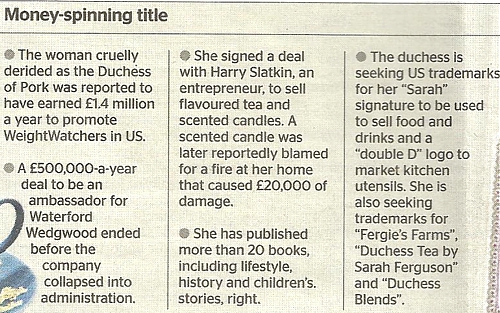
Fergie’s latest wheeze, Duchess Discoveries is being promoted heavily on US television. It bears a close resemblance to those ghastly daytime TV advertising channels. Watch her interview on a US TV programme, "Today".
It’s partly promoting her latest diet scam, and partly a vigorous defence of her ex-husbands innocence in the face of allegations of sexual shenanigans. Of course she doesn’t know whether the allegations are true. The Queen doesn’t know (so why bother with the denial from Buckingham Palace?). And I don’t know. We know plenty about Prince Andrew’s bad behaviour, but we don’t know whether he’s had sex with minors.
Worse still is the promotional video on the “Duchess Discoveries” site itself.
I quote:
“I’m SO excited about my fusion accelerator system, accelerates weight loss, accelerates your energy, accelerates and strengthens your immune system.”
"accelerates weight loss" is certainly unproven. Mere hype
"accelerates your energy" is totally meaningless. It’s the sort of sciencey-sounding words that are loved by all quacks.
"accelerates and strengthens your immune system". Sigh. "strengthening the immune system is the perpetual mantra of just about every quack. It’s totally meaningless. Just made-up nutribollocks.
The promotional video is fraudulent nonsense. If it were based in the UK I have no doubt that it would be quickly slapped down by the Advertising Standards Authority. But in the USA the first amendment allows people to lie freely about nutrition, which is why it’s such big business.
It bothers me that the most that the best that the British Nutrition Foundation could manage was to say that such claims "need to be treated with caution". They are mendacious nonsense. Why not just say so?
Follow-up
A recent post, A right royal cock-up, got a lot more press attention than I’d expected. Perhaps I should have realised that the mainstream media are fascinated with anything that involves royalty. Here is my last word on that topic.
My reasons for writing about it had very little to do with royalty. I was elected to the Royal Society in 1985 and I’ve tolerated the odd voting forms, and the election of Royal Fellows, in silence for the last 27 years. What made me speak out this time was almost entirely to do with Andrew’s record of dubious behaviour. For me, it was a moral question, not a question of royalty per se.
The election of Prince Andrew (as a "Royal Fellow", not on scientific grounds) attracted 171 votes and 1128 non-responders. I was curious to know why so many people failed to vote. I was also curious about the statement made to the Sunday Times
"David’s [Colquhoun] views about our royal connections are very much in a minority"
Since I don’t recall being asked, I’m baffled about what data (if any) on which that statement was based. There was only one way to find out. To ask. The following email was sent at around 5 pm on Friday 17 May.
|
Subject: A very quick question about the election of Royal Fellows In the light of the recent publicity surrounding the “election” of Prince Andrew as a Royal Fellow, I thought that, because so few people voted, it would be interesting to know the views of all fellows on this tradition. This mail is being sent to the 1197 fellows whose email address is given in the Year Book. All you need to do is to hit reply and put YES or NO next to the following two questions. Only the total numbers are interesting. I promise not to reveal how anyone voted. 1) Do you think that the time has come to discontinue the tradition of electing Royal Fellows? 2) Do you think the election of Prince Andrew, in particular, has harmed the reputation of the Royal Society? NB These questions do not refer to the monarch as patron (but if you have an opinion about that. please say so). Best regards David Colquhoun |
The intention was to word it as neutrally as possible. Few people expressed an opinion about the monarch as patron. I see no harm in continuing that tradition myself.
What happened?
First, the Year Book is out of date. 106 emails bounced, several were "out of office", and a few recipients had died. So about 1080 emails should have arrived. I have no way of knowing how many were opened and read.
After one week, 324 replies had arrived, almost twice as many as the 171 votes cast in the original ballot. A couple of responses were surprisingly abusive. More were supportive. Most made no comment. 70% of those mailed didn’t respond. The 30% return rate is certainly a flaw, tnough not as big a flaw as the 13% return rate in the orginal poll,
Perhaps 30% isn’t so surprising. A weekly newsletter goes out to all UCL staff, and it has interesting information, though a bit too PR-like for my taste. But I’m told that 50% of emails sent out are never even opened, never mind read.
The results were as follows.
Of 302 who answered question 1, 131 (43%) said YES
Of 284 who answered question 2, 151 (53%) said YES
It was noticeable that those who work outside the UK were distinctly more likely to say NO. Perhaps they are unaware of the extensive press coverage about Andrew in the UK? 54 answers were received from people with .edu addresses, 32% yes for question 1, and 38% yes on question 2. If these are excluded on the grounds that they are unlikely to be aware of the problems, the results are
Of 248 who answered question 1, 114 (46%) said YES
Of 239 who answered question 2, 134 (56%) said YES
It might also be relevant almost half the fellows are 70 years old or older and 80% of fellows are 60 or older. That’s not surprising because very few people are elected at younger than 40, many are much older, and once in, you are in for life.
What can we conclude?
(1) 70% of those mailed have little interest in the politics of the RS, and there is no way to know whether they even opened my mail,
(2) Roughly half of those who expressed an opinion agreed with me
so
(3) it is not true that "David’s [Colquhoun] views about our royal connections are very much in a minority".
It seems to me that these numbers provide a good case for the RS Council to consider whether or not it is a good idea to continue to nominate Royal Fellows.
One more thing
The Sunday Times was also told
"The Duke of York is beloved by the tabloids but he has always had a robust defence in these issues . . . I think David is quite wrong to raise that"
It is most certainly not true that Andrew’s reputation is bad only in tabloid newspapers.
Try this leader in the Times (March 2011) “Undiplomatic Envoy. Prince Andrew’s friendship with a convicted US financier is an embarrassment. He should resign as a trade envoy“. [pdf]There are many more reports like that in the Times.
The most royalist of Conservative broadsheets, the Daily Telegraph, broke the story of abuse of aircraft and published Timeline: the Duke of York’s questionable friends. And the Telegraph’s chief reporter wrote "Sack the Duke of York as trade envoy, says former ambassador". And in 2012, the Telegraph wrote "Money laundering probe puts spotlight on the £15 million sale of the Duke of York’s home"
In March 2011, Channel 4 News wrote “Prince Andrew: ‘Cheerleader in chief for the arms industry‘
The Guardian has been critical since 2004. And of course it was the Guardian who published the cables that revealed Andrew’s curious attitude to bribery in arms deals.
These are not tabloids. The fact that every newspaper has written this sort of thing is what caused me to worry that his election would not go down well with the public. One of the most alarming aspects of the affair was the comments left by readers on the various newspaper articles. They did not give the impression that the public was as impressed by the Royal Society as its fellows tend to be. That is bad for everyone because the society does much good work, in funding science (in particular the excellent University Research Fellowships which give young scientists five years of independence).
Postscript
I do sometimes wonder about the value of prizes and honours. My attitude to them is very much like that of one of my great scientific heroes, Richard Feynman. Watch this.
Follow-up
26 May 2013 The Sunday Times was onto the story quickly again, with a short piece. The cartoon isn’t totally appropriate (for me) since I’ve said repeatedly that it is Andrew’s morals that worry me, far more than his royalty.
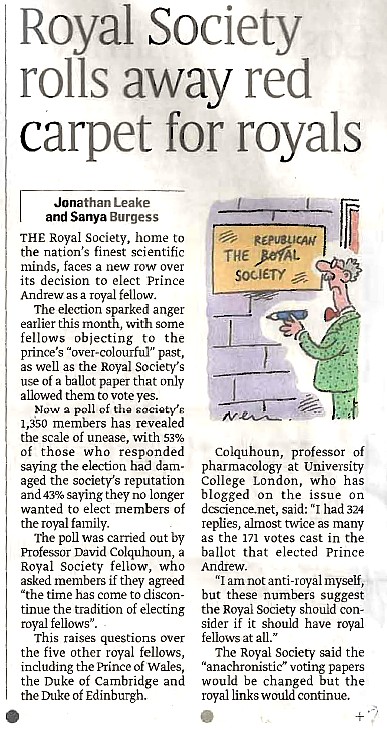
Today the Royal Society elected Andrew, Duke of York, as a “Royal Fellow”. Well, to be exact. 11% of them did. The numbers, which the Society has not made public, were as follows (as fraction of the electorate, 1300 Fellows)
Yes 147 (11%)
No 24 (2%)
Blank ballot 1 (0.08%)
Failed to vote 1128 (87%)
Hardly resounding support, then.
When I heard that the Society’s Council had nominated the Duke of York, I was sufficiently outraged to write a piece along the lines below. I was thinking about breaking the rules and going public with it before the election. I’m not particularly republican, but I do think that the Royal family still have too much influence on politics (as well as pernicious social effects).
On Monday 8th April I discussed the matter with the president, Paul Nurse. He was charm itself, but he didn’t explain what the advantages to the society were, and he didn’t agree to my proposal to mail my views to all Fellows. It seems odd that fellows have no way to communicate with each other , but that is how it is. But he did agree to set up an internal web site where Fellows could discuss the nomination in private. Most of them didn’t bother, but those who did were unanimous in supporting my views, apart from three members of Council, which had nominated him. Some people think that it is better to not to air disagreements in public. I don’t agree. I think it should be known that few people voted for this move. So here is what I wrote,
A curious fellow
The Royal Society has, on the whole, some pretty bright Fellows. It’s been around for 360 years and that, no doubt, is why it also has some quaintly archaic customs. One of them is the election of “Royal Fellows”. They are described as “Members of the Society by virtue of royal blood”, though ‘royal blood’ is a curiously unscientific idea.
The Royal Society was founded in 1660, and was granted a royal charter by Charles 2nd. The Society was a manifestation of the age of enlightenment. It might be seen as a harmless eccentricity that one of the present royal fellows said that he was rather proud to have been accused of being an enemy of the enlightenment. That, of course, was the Prince of Wales (known affectionately in the blogosphere as the Quacktitioner Royal).
The Royal Society was founded to advocate the idea that observation was what mattered, not deference to authority. The exception to that seems to be deference to “royal blood”.
But I believe it is taking deference too far to elect Prince Andrew. Not believing in science is one thing. Accusations of bribery and corruption in the sales of arms to dictators are quite another. From the leak of US diplomatic cables in 2010 we know, through cables from the US Ambassador to Kyrgyzstan, some unsavoury facts. During discussions of bribery in Kyrgyzstan and the investigation into the Al-Yamamah arms deal, the Duke “railed at British anti-corruption investigators, who had had the “idiocy” of almost scuttling the Al-Yamama deal with Saudi Arabia”. He was talking about kickbacks to a senior Saudi royal had allegedly received in exchange for a huge arms contract with BAE Systems. The cable went on “He then went on to ‘these (expletive) journalists, especially from the National [sic] Guardian, who poke their noses everywhere’ and (presumably) make it harder for British businessmen to do business. The crowd practically clapped!”. There could hardly be stronger evidence that bribery to sell arms had the approval of the Duke of York. The affair was hushed up when Tony Blair’s government shut down the investigation into the affair by the Serious Fraud Office, but the head of the SFO said that the decision to stop the investigation may have damaged “the reputation of the UK as a place which is determined to stamp out corruption”. The USA was less squeamish. A judge said that BAE’s conduct involved “deception, duplicity and knowing violations of law, I think it’s fair to say, on an enormous scale”. This is what the Duke of York was so eager to hide from the eyes of “these (expletive) journalists”.
Earlier in 2010 it was discovered that the billionaire son-in-law of Kazakhstan’s President paid the Duke of York’s representatives £15m via offshore companies, for the Duke’s mansion, Sunninghill Park. That was investigated by prosecutors in Italy and Switzerland.
It doesn’t end there. In 2011 the Duke of York got yet more bad press after revelation of his close friendship with Jeffrey Epstein, who was convicted in Florida for soliciting an underage girl for prostitution. In July 2011, the Duke’s role as a trade representative was ended.
As recently as 2012, the Duke was criticised for his close friendship with the president of Azerbaijan, Ilham Aliyev, who is regarded as one of the most brutal and corrupt rulers in the world. By this time, Prince Andrew had He lost the support of even the most Royalist newspapers.
A record like that makes the Duke of York an unsuitable person to be a member of any club, never mind election as a fellow of the Royal Society.
There is one section of society which regards scientists as amoral automatons, willing to shut their eyes to wrongdoing if it is in their own interest to do so. I have met very few such people, but the election of Prince Andrew can only reinforce that view.
The citation sent to me by the Royal Society mentioned none of his unsavoury history. It referred only to the ‘benefits’ that election would have for the Society. What exactly these benefits are has never been explained. They seem to amount to chairing a few meetings and dinners. Many of us would prefer not to have dinner with him. The nomination was a good example of that prime scientific crime, cherry-picking the evidence.
The proposal was accompanied by a ballot form. The form had a single box, labelled “I support the election of HRH the Duke of York KG GCVO as a Royal Fellow of the Royal Society”.
That’s the sort of ballot form used for senior posts in the Royal Society. It would be popular in Kazakhstan or Saudi Arabia.
Here is the ballot form that I returned [download pdf]
Follow-up
5 May 2013. The Sunday Times was on to this story quickly, and it was on their front page.
The story [download pdf] quotes past president Robert May, and Peter Lawrence (prof of Molecular Biology, LMB, Cambridge) who supported my views.
5 May 2013. I had the best laugh for years when I read the post by James Wilsdon who is now professor of science and democracy at the University of Sussex, but was previously director of science policy at the Royal Society, so he has had an inside view. His post makes mine look gentle.
“But now, Prince Andrew has been invited into the Royal Society’s ranks. And a fair number of his fellow Fellows aren’t happy. First off the blocks was David Colquhoun, UCL’s most famous pipe-smoking pharmacologist, who on Friday launched a full-frontal attack on his blog on what he called a “right Royal cock-up”. And today, the story has hit the front pages of the Sunday Times, with even the society’s former president, Bob May, reportedly “dismayed” over Andrew’s election. ”
“Controversy surrounding his role as a UK trade envoy, and his equally unsavoury association with a convicted US sex offender led to him resigning his role as “Airmiles Andy” in July 2011. Ministers and senior officials within the Foreign Office privately breathed a sigh of relief.
It was around this time that Prince Andrew started popping up more regularly at Royal Society events, offering to chair meetings and lend his support. (I was still working there at the time as director of science policy). The sensible response would have been to steer well clear, but as I witnessed at first hand, for such an incredibly clever bunch of people, elected themselves on merit (the very antithesis of hereditary royal privilege) many fellows of the Royal Society were susceptible to feudal levels of swooning at the merest flash of royal ermine. The centrepiece of its 350th anniversary celebrations in 2010 was an orgy of obsequiousness at the Festival Hall, with no fewer than seven Royals and 2000 guests in attendance to see Prince William receive his Royal Fellowship (no doubt for his outstanding services to art history, geography and steering helicopters).”
“Full credit to David Colquhoun for shining a light into one of the darker recesses of the scientific establishment. Of course, defenders of the decision will point out that this is the “Royal” Society, and a bit of old-fashioned bowing and scraping is part of its unique British charm. But there are plenty of equally prestigious institutions with a rich royal history that have modernised those networks of patronage, and aren’t spending the 21st century with their heads rammed quite so firmly up the Windsor arse. Nullius in verba, old chaps, nullius in verba…”
As we say in the blogosphere, ROFL.
The Guardian had a lot of coverage too. James Wilsdons piece appeared also in Guardian blogs: Royal society row over election of Prince Andrew as fellow. There is also a piece on the same topic by Peter Walker, “Royal Society scientists angered by Prince Andrew’s election as fellow“.
6 May 2013. There is an account in the Daily Mail by Nick Fagge. I won’t link to it because it is a shameless cut and paste job from the Sunday Times, with several mistakes added. The Mail at its worst.
The Independent asked for an op-ed column from me on Sunday. It appeared the next day. Mostly it was a shortened version of this blog, with the links removed (I wish they wouldn’t do that). But I did get in a comment that I often make in private.
“Certainly monarchs in recent times have shown little interest in science. If I wanted a tip for the winner of the 14.30 at Newmarket, I’d ask a royal. For most other questions, I wouldn’t.”
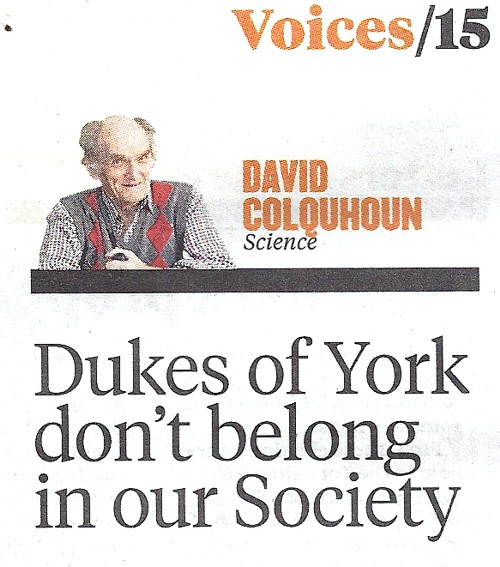
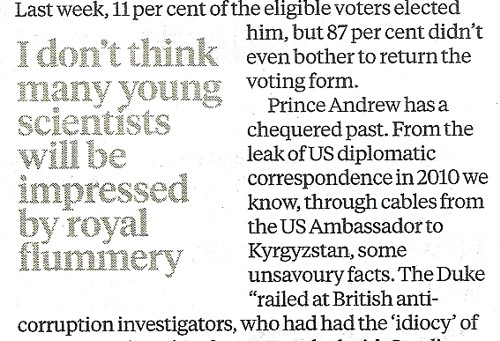
The Independent also carried a piece by Kate Morris on the same topic.
The Times had an interesting piece, by Hannah Devlin. They quote James Wilsdon
“James Wilsdon, Professor of Science and Democracy at the University of Sussex and formerly head of policy at the Royal Society, described the appointment on Twitter as “needless establishment toadying”. “Plenty of institutions with a royal history that aren’t spending the 21st century with their heads lodged quite so firmly up the Windsor a***,” he tweeted yesterday.”
and
“Richard Horton, editor of the medical journal The Lancet said that the decision to “grovel to royal patronage” was an “embarrassment for science” and “symptomatic of Britain’s corrupt honours system”.”
The Financial Times had a short report too.
International coverage
The story quickly went international. Stories appeared in the Gulf Times, the Economic Times, the Statesman (India), the Kashmir Times, the Indian Express
USA News Online reproduced both the Guardian article and James Wilsdon’s feisty piece in the Guardian.
7 May 2013
There is a report today in Paris Match “Andrew trop Royal pour la Royal Society”
8 May 2013.
Alice Thomson writes in the Times “One more reform for the Queen: her family. She needs to streamline ‘the Firm’, especially when the Royal Society treats a minor royal with absurd deference”.
Here are a few quotations.
“Yet the Fellows (or rather 11 per cent of these illustrious academics) have elected the grand young Duke of York to their number, a man who may have many hidden talents but who paddles at the shallower end of the intellectual pool.”
“it seems extraordinary that they have elected a minor member of the Royal Family who once piloted helicopters and knows more about golf than genomes.
The RS is obviously royal as well as a society but they already have Prince Philip, the Prince of Wales, the Princess Royal and Prince William. Any more and they will start looking like the Sandringham Christmas shoot. They stopped electing prime ministers after Margaret Thatcher but seem incapable of excluding the fourth in line to the throne.
This makes the Fellows appear antiquated and obsequious; but the bigger problem is what to do with these minor Royals.”
“But his tenure as special trade envoy has not been a success. He managed to turn the fairytale of the Princess and the Pea into the nightmare of the Prince and the Paedophile when he befriended the sex offender Jeffrey Epstein. ”
“No 10 increasingly don’t know what to do with him. “No one knows whether to bow, shake his hand or quietly slip out of the room when he arrives,” says one minister. The Queen tried to make amends by bestowing on him the Knight Grand Cross of the Royal Victorian Order, which allows him to wear a red, white and blue sash. ”
“The Royal Society was set up as a manifestation of the age of enlightenment. Nearly 360 years later, we should be enlightened enough to enjoy our constitutional monarchy — but we should not be bowing and scraping to the minor players in the Royal Family. They should have retired from the national stage long ago.”
This all seems very sensible to me. Incidentally, Alice Thomson is great-granddaughter of the famous physicist, J. J. Thomson, who was president of the Royal Society from 1915 to 1920.
10 May 2013 The affair has even reached Have I Got News for You. Here is the clip.
The Daily Mirror also weighed in, in fine tabloid style
Cack Andy-ed
The Royal Society, Britain’s top scientists’ club, has elected Prince Andrew a member.
Why? Nobody would ever accuse the Duke of York of being an intellectual. He’s as dim as a Toc H lamp.
The ballot paper permitted only a “Yes” vote, and 90% of members declined to back him.
A right royal farce. Only really clever people could make such common fools of themselves.
The nation’s best brains should stop tugging their forelock and drop “royal” from their title.
The royals don’t know a hypotenuse from a hyphen. Why not just call it The Science Society?
An interview on Voice of Russia Listen here

